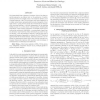Free Online Productivity Tools
i2Speak
i2Symbol
i2OCR
iTex2Img
iWeb2Print
iWeb2Shot
i2Type
iPdf2Split
iPdf2Merge
i2Bopomofo
i2Arabic
i2Style
i2Image
i2PDF
iLatex2Rtf
Sci2ools
107
click to vote
ICASSP
2011
IEEE
2011
IEEE
Approximated kernel density estimation for multiple TDOA detection
The Generalized State Coherence Transform (GSCT) has been recently proposed as an efficient tool for the estimation of multidimensional TDOA of multiple sources. The transform defines a multivariate likelihood of the TDOA through a non-linear integration of complex-valued states, representing the acoustic propagation of multiple sources. In the previous works the non-linearity was heuristically motivated leading to a difficult interpretation of the resulting likelihoods and of a correct choice of the parameters. Modeling the time-delays of the acoustic propagation of multiple sources with a multivariate multimodal distribution, a non-parametric kernel density estimator may be derived, which intrinsically accounts for spatial aliasing. From the theoretical analysis it follows that with an appropriate frequency-dependent non-linearity the GSCT likelihood approximates the true kernel density. Theoretical discussion is confirmed by experimental results which show that the proposed non...
Related Content
| Added | 20 Aug 2011 |
| Updated | 20 Aug 2011 |
| Type | Journal |
| Year | 2011 |
| Where | ICASSP |
| Authors | Francesco Nesta, Maurizio Omologo |
Comments (0)

